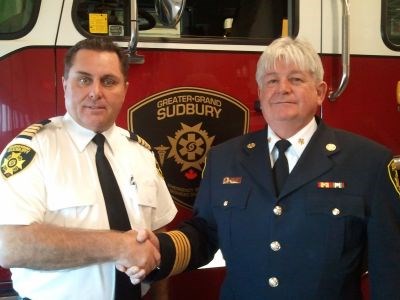After 35 years with the Sudbury fire service, Marc Leduc is calling it a career.
Leduc, having spent the past three years as fire chief, is handing over the reins to deputy chief Dan Stack, who assumes his duties, Dec. 1.
Leduc said it is with “mixed emotions” that he will hang up his bunker gear. His immediate plans are to catch up on some much-needed rest and relaxation, and to spend more quality with his family. He will become a grandfather for the first time next year, and the free time he will gain through his retirement will provide ample opportunity for him to dote upon the newest members of his family.
“It's hard to let go of something you've been a part of for so many years,” Leduc said. “But, I'm excited and looking forward to the next chapter of my life and where that will bring me. My daughter lives in Toronto, so I'll be able to see her a lot more often, and my son lives here in Sudbury. I'm really looking forward to being a grandparent for the first time next year.”
Thirty-five years has gone by in a flash, he said.
“I'd do it all over again, given the opportunity. It has been an honour and a privilege to serve the community in the various capacities I've held with the fire department.”
As time goes by, Leduc said he plans to get involved with community work. After so many years with a fire department as busy as the Sudbury hall, it won't be easy to just sit back and watch others doing all the work.
A great deal of change has taken place with firefighting since Leduc first put on his bunker gear in 1977. At that time, health and safety was practically non-existent for firefighters.
“Firefighters used to be totally exempt from the Occupational Health and Safety Act, but over the years, certain parts of the Act became more applicable,” Leduc said. “Danger is part and parcel of the job, but with all of our procedures and training, it better prepares firefighters to handle all situations.”
Advancements in technology, combined with better education and training, improves the safety of firefighters, Leduc said, but fire departments have also introduced such initiatives as Rapid Intervention Teams, which attend working fires in case firefighters end up trapped.
“Today's bunker gear provides much more protection to the firefighter, and thermal imaging cameras allow firefighters to detect hot spots within a burning building or to see through the thick smoke in rescue efforts.”
Leduc said he has every confidence in Stack's ability to lead the fire department.
“I'm sure he'll do well, and I wish him and the entire service all the success in the future. Change is good. The department has been around for more than 100 years, and it will be around for many more years to come.”
Stack is a 34-year veteran of the local fire department, and has spent the last three years as deputy chief. He said most firefighters when they first start out, never think they'll become chief.
“It's an honour to be appointed, and I really look forward to the challenge of keeping the fire department moving forward.”
When Stack first started his career, the role of a firefighter was strictly about fighting fires, with a little bit of extrication during motor-vehicle collisions. Today, attending MVCs is an intricate part of a firefighter's duties they face every day. Among many other things, firefighters are also trained for water rescue missions dealing with all kinds of factors, as well as with hazardous materials.
Firefighters entering the service today are better educated than when Stack first picked up a fire hose, but it's more demanding for potential firefighters to even get a foot in the door, he said.
“We could have 500 people applying for maybe four spots, and they are put through a series of stages where their education and training play a major role in advancing through those stages. When I first started, we went through two weeks of on-the-job training and then you were on a shift. Now, there's eight to 12 weeks of training involved before new recruits are able to take on their full duties.”
Stack will oversee a staff of 108 full-time firefighters, as well as prevention staff, public safety officers and about 340 volunteers.
Prevention and public education are key components to the success of the fire department, and it's the top priority for firefighters, he added.
“I believe the public is really adhering to our message,” he said.
He said he takes a lot of joy in the fact that no two days are ever the same, and every day brings a new challenge.
Posted by Mark Gentili
Join Sudbury.com+
- Messages
- Post a Listing
- Your Listings
- Your Profile
- Your Subscriptions
- Your Likes
- Your Business
- Support Local News
- Payment History
Sudbury.com+ members
Already a +member?
Not a +member?
Sign up for a Sudbury.com+ account for instant access to upcoming contests, local offers, auctions and so much more.
